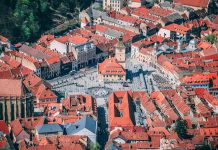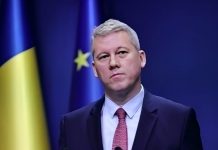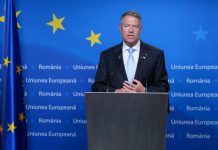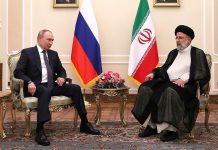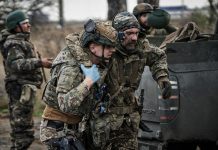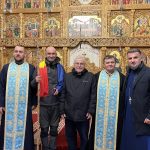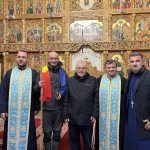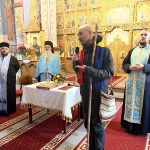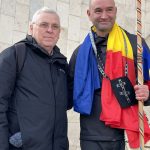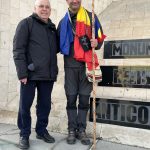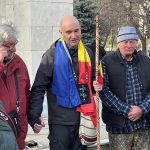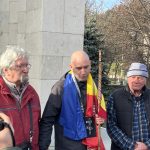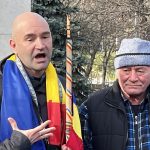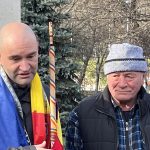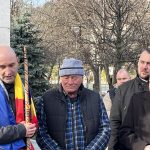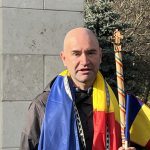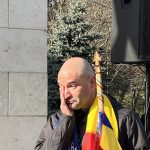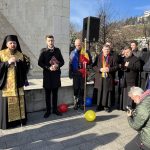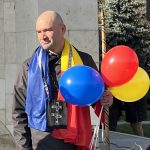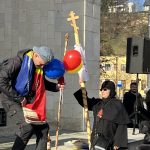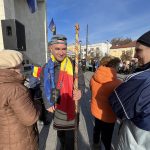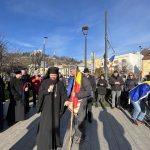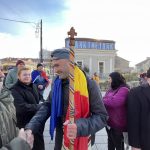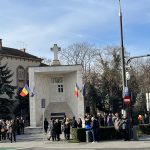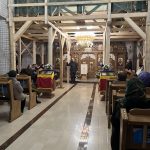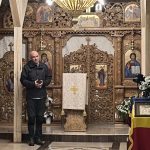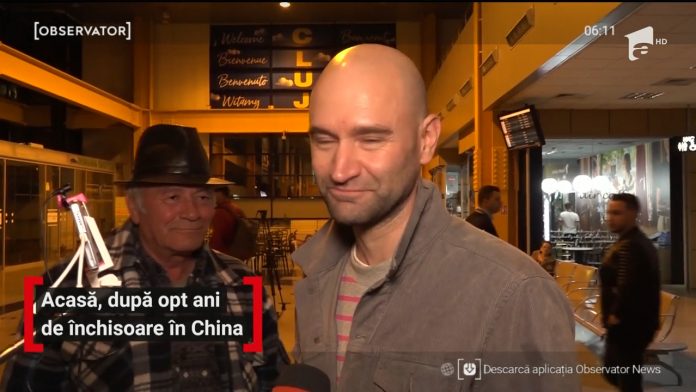
We were marching through the Transylvanian city of Cluj. Our destination was within striking distance, the Anti-Communist Resistance Monument. This landmark is a symbol of resistance and is a tribute to all the victims of Romania’s Communist dictatorship. Our imminent arrival on Romania’s National Day, 1 December, gave rise to a burning sense of anticipation and fulfilment. I had joined Marius Balo for the final leg of his 100-day pilgrimage. Many supporters and well-wishers attached themselves to the column as we neared the finish line.
At the monument, on the edge of a park named after Simion Bărnuțiu, a Romanian historian and liberal politician and leader of the 1848 revolutionary movement, a large crowd had gathered. Senior Romanian orthodox priests, elderly victims of communism, journalists, TV crews and members of the public were waiting. All clapped and cheered Marius’s arrival. Marius was in tears, as were many of the greeters, including Marius’s only two direct relatives, a Romanian uncle and a Hungarian uncle.
For Marius, his 2,922 kilometre hike was more than a one-off trek on foot across Romania. It was not just a pilgrimage across his country. It was an allegory for his entire life, and it was redemption and salvation after an eight-year ordeal from 2014 to 2022, arbitrarily imprisoned in Chinese jails. It belonged to a greater odyssey and search for the meaning of life.
For 100 days Marius had walked across Romania, with shaven head and a long wooden pilgrim staff lovingly crafted by a nun, trekking between one prison and another, and between former Communist-era labour camps, to spotlight the issue of wrongful imprisonment in communist states, including China, where for eight years of his prime he was one of many foreigners jailed on false charges. This walk was an extraordinary feat on a route which had profound symbolism.
The sites he visited included notorious communist-era prisons and camps such as Jilava near the capital Bucharest, Sighet in the far north of the country, and Periprava, a mosquito-swarmed camp in the Danube Delta, whose commandant Ioan Ficior was convicted in 2017 of crimes against humanity and sentenced to 20 years in prison for the deaths of 103 political inmates. Periprava, close to the former Soviet border, held more than 8% of Romania’s political prisoners in its heyday.
I came here to salute and support Marius and record his feat. In some ways, it was just as poignant an event for me as it was for him. I had worked in Romania for Reuters from 1990 to 1994 reporting the end of Nicolae Ceausescu’s Stalinist dictatorship, the 1989 revolution and the slow recovery from decades of trauma. I am also a sinologist, who has spent much of my life in China, where I was an anti-fraud consultant for the last 15 years of my career and then in 2013 suffered two years of arbitrary imprisonment (along with my wife) on false charges of illegal information gathering. I contracted cancer due to mistreatment in Shanghai’s jails.
So although we had never met in person, we had a lot in common. As a mentor nowadays to families undergoing similar ordeals and to prisoners who have been released from China, and with the eyes of a professional fraud investigator, I have studied Marius’s case including his Chinese court records and I believe in his innocence. We share a common sense of justice and a desire to help others who have suffered similar injustices at the hands of the Chinese Communist Party.
The Marius whom I met in Cluj was kindly and courteous to the point of sweet. He is diligent and cares more about others than himself. Naïve, perhaps, and highly vulnerable to predators who you find in China perpetrating all forms of fraud, who dragged him unwittingly into their criminal scheme.
The 42-year-old teacher and theologian, who studied divinity in New York before his doomed journey to China, looms almost two meters tall and is everybody’s idea of a friendly giant. To Chinese fraudsters he was gullible. To me it becomes quickly obvious that he is also a highly spiritual, devout Christian, possessing a faith and a caring for his fellow-man that protected him and pulled him through that terrible ordeal which would crush most other humans.
Released from China last April amid China’s draconian zero-Covid controls, Marius breathed his beloved Transylvanian air again in Cluj for the first time in 12 years (he spent four years as a teacher in China before his wrongful arrest), and now he plotted this unusual pilgrimage.
“I wanted to do this for all those who have endured wrongful imprisonment under Communist regimes,” he told me. “And for myself, to unleash my spirit,” he said.
“I was asking myself, how can I use the enormous energy that I had been stocking up for the past eight years? Of course, like some other men, I could smoke, drink or chase girls. But it’s totally selfish since I would be the only one to enjoy it. I wanted to share this energy with the community that I’m now part of once again,” Marius said.
So I asked him how he chose what seemed to me to be an unprecedented pilgrimage route.
“I had the idea that I wanted to walk one kilometre for each day I spent locked up in China’s Communist heaven,” he said, with irony. “But my main theme was to visit and pay homage to the shrines and monuments that were erected at former prisons and concentration camps where for 50 years of Communist rule millions of Romanians, prisoners of conscience, were incarcerated, and many killed, during the most evil era of persecution these lands have ever known,” he explained.
His eight years in two Chinese facilities totalled 2,922 days, so he decided to walk 2,922 kilometres spread over 100 days. “It was a time of healing, a time during which every cell in my body was renewed and re-atomised. A new day and the start of a new life,” he said.
“I was not sure when I headed out how my effort could contribute to society as a whole. I had an idea about inspiring people to dare to attempt extraordinary feats. But it turned out to be much more than that,” he said, because he attracted a multitude of supporters, helped on by Romanian media.
His pilgrimage was supported by the Romanian Orthodox Church, Romanian Television and by the Doina Cornea Foundation, named in memory of Romania’s best-known human rights activist and dissident during the Ceausescu dictatorship. Doina Cornea died in Cluj in 2018, aged 88.
“Some people joined me walking for a day or two here and there which was great. But thousands of people came out to cheer me on virtually every day because long-desired and sometimes almost forgotten feelings were aroused inside of them. What these feelings were is unique to each individual but the overwhelming feedback I received was highly positive and inspiring. They ended up inspiring me,” Marius said. There were fellow pilgrims walking with him for about one quarter of his journey.
There were setbacks, not moments of hesitation or defeat, but injury. I know personally how weak a human body becomes after a long imprisonment in China’s inhuman jail conditions. A prisoner often emerges emaciated and enfeebled due to malnutrition, with very little muscle, weak joints and recurrent fatigue. (I certainly did, too.)
As prisoners of China, Marius and I, in separate periods, lived in Shanghai’s Qingpu Prison in unsanitary cells with 12 cellmates on a floor space of 15 square metres, with no hot water, no winter heating, a hole in the floor in the corner serving as our toilet, and filthy food lacking in nutrients. Serious medical conditions went ignored and untreated, such as my prostate cancer. Prisoners were coerced to sign false confessions to their alleged crimes in order to qualify for medical treatment and for a merit-point scheme and sentence reductions (which never came). They were pressured into manufacturing labour from which the prison and its officers commercially profited. For the last three years of Marius’s captivity, the prisoners in Qingpu were given no outdoor exercise, sunshine or fresh air, under the excuse of Covid controls, creating an additional layer of incarceration. All this abuse takes its toll and wrecks the human body.
So did Marius ever fear he might not be able to finish the walk? “After two thirds of the way, pain hit my left knee. I carried on, hoping it would go away, until I could barely walk on it. So I took a break, I rested in bed for two full weeks in the city of Deva. But then I remembered I should let go and place myself in God’s hands. I did this before, in prison, and it served me well. Now, it served me well again. After a couple of weeks I started walking again like nothing ever happened.”
One Romanian who encountered Marius along his route captured the public mood that he inspired. „Marius has reawakened inside each of our hearts feelings long forgotten. Feelings of thanksgiving and love, towards God and towards our country,” said Dorina Vamoș.
The media coverage reflected nationwide support. A TV Romania (TVR) team joined Marius on 21 occasions in the course of his pilgrimage, according to TVR documentary maker Alexandru Munteanu.
„Marius Balo spent 2,922 days sealed off from the world, far away from his county, years of solitude in a harsh and alien world. Then he spent 2,922 kilometres walking, searching for meaning and peace. Millions of steps looking for God,” said TVR talk show host Iuliana Marciuc.
“I was his guide at one former labour camp and two former political prisons. Marius has told his story in two TVR shows so far. I have made a 100-minute documentary about his pilgrimage which will be broadcast in February or March,” said Munteanu.
“In the Chinese prison Marius rediscovered God. In his pilgrimage he rediscovered himself. I am sure of that. I will say more about it in my documentary,” he said.
TVR journalist and producer Constantin Lupescu, who conducted lengthy conversations with Marius, said the pilgrimage helped express things that words could not.
“I think Marius learned something important from his experience in China’s prisons, something that is hard to put into words, and he decided to go on this pilgrimage to say what he had learned from eight years in the darkness,” Lupescu said.
“His appearances on national television are the most important support he could receive because they helped people understand what he had done,” Lupescu said.
„This is an incredible life story out of which Marius Balo came out stronger, wiser and more determined to cherish every single day and every breath of fresh air as if they would be his last,” said journalist Luiza Toboc, from the newspaper Observatorul Prahovean.
On the evening before the final leg of the pilgrimage, I arrived by car at a little white church in the small town of Apahida near Cluj. What I found was a beautiful religious gathering under way, with Marius at centre stage. Much of the Romanian language went over my head but the entire scene – the décor, lighting and the music inside the church – was so beautiful that it blew me away.
Marius was delivering an emotional narrative of his ordeal. He had been doing so regularly along his pilgrimage route to many church audiences who warmly welcomed him.
One after another now, various Orthodox priests, some of whom knew Marius personally for years, or were his classmates, gave speeches and sermons about the endurance and heroism of his ordeal and the love of God that protected him. The church provided a dinner for everybody afterwards. The love and speeches continued to flow. I witnessed more scenes like this upon completion of the pilgrimage the following day.
Upon arrival at the monument, priests and the bishop delivered warm words of praise. There I also met Marius’s two uncles, one being the brother of Marius’s Romanian mother and the other being the brother of Marius’ Hungarian father. According to Marius, these are his only blood relatives. I spoke to both of them.
„For a long time I didn’t understand what his pilgrimage was all about. I thought it was a waste of time. Seeing the crowds of people who came out for him when he arrived home,” I finally got it,” said uncle Ioan Felecan, who lives in Cluj.
„I was honoured to represent Marius’ Hungarian roots at his arrival ceremony,” said uncle András Baló, streaming tears. Uncle Andras has lived in Budapest for many years and it was the first time the two uncles had stood side by side in decades, one for each of Marius’ deceased parents.
The clergy I met at these events were brimming with praise for Marius. „You become truly free only when you assume the situation you’re in. Marius has been able to do that and it meant his salvation,” said Rev. Fr. Prof. Dr. Ioan Chirilă.
„Marius’ Pilgrimage speaks loudly to us all about the spiritual resources we each have at our disposal when we’re called to walk through the fiery furnace of affliction. His new life starts now,” said Bishop Benedict of Cluj.
After the pilgrim’s arrival ceremony, we all gathered at the picturesque Florești Romanian Orthodox Monastery in the hills near Cluj, for yet another religious service and dinner in Marius’ honour. The only foreigner in attendance, I was invited to say a few words about who I was and why I was there, with Marius translating for me.
I explained my own story of arbitrary imprisonment in China and my mentoring activities for others who are suffering similar ordeals. Speaking as a specialist on China, I described the Chinese legal and judicial system and explained that no prisoner in China has ever had a fair and transparent trial and that many are unjustly jailed. I monitor the release of prisoners and interview them to gather information about prison conditions and individual cases, I said. From one of them I had learned about Marius’s story and his character and I was deeply impressed by his spirituality and his integrity. I could not possibly fail to connect with him after his release and could not possibly be absent from the completion of his pilgrimage here.
I believed that Marius and I could work together to spread awareness about judicial and penal abuse in China.
How often does a society embrace somebody released from prison, somebody released from a foreign jail, without some lingering suspicion? The warm welcome and compassion that I saw in Cluj, and more widely across Romania, was illuminating. It was something I had never seen before. For me it underlined what a decent man Marius is. It reminded me of an oft-quoted line from a wise elderly friend of mine: “You can tell the quality of a man by the quality of the people who gather around him.”
In 2014, the Chinese police, the PSB, arrested 21 people all in all, Marius being the sole foreigner. It was a classic Chinese fraud gang who had set up loan companies ostensibly giving out loans. It was a scam where they had created an elaborate set of eligibility processes which required pre-paid fees. Then they told their clients the loan had been refused. They pocketed all sorts of up-front fees that the clients had paid. Marius was not part of that scheme but was unwittingly used as a “white face” to give the criminals credibility at contract signing ceremonies and public events. This type of scheme was rampant in China at the time.
Marius was listed as suspect number 19 in the arrests. But then the authorities split the case. They shunted Marius and a young Chinese woman into a smaller side case in which Marius amusedly declares he was now listed as “suspect number 1”.
Both of them were prosecuted as accessories to the crime committed by the Chinese gang. In my professional view as a fraud investigator, having reviewed the Chinese court records, I do not consider Marius or the Chinese girl guilty of any crimes. It was an example of PSB overkill in what Beijing called ”strike hard” campaigns, ordered by Communist Party dictator Xi Jinping, this time one campaign against swindlers and one against foreigners. Marius became a scapegoat.
He is now writing a novel based on his experience and is contemplating the possibilities for his future after eight lost years: teacher or priest, writer or activist against forced labour, are all on his radar.
For me, Marius’s completion of his pilgrimage is a celebration of moral victory and exoneration. It resonates deeply.
Peter Humphrey is a British sinologist, former journalist and fraud investigator who spent two years in China’s jails in 2013-2014 on false charges of illegal information gathering. He is now a mentor to families of foreigners imprisoned in China and to recently released foreign prisoners. He is an external research affiliate of Harvard University’s Fairbank Centre for Chinese Studies.



